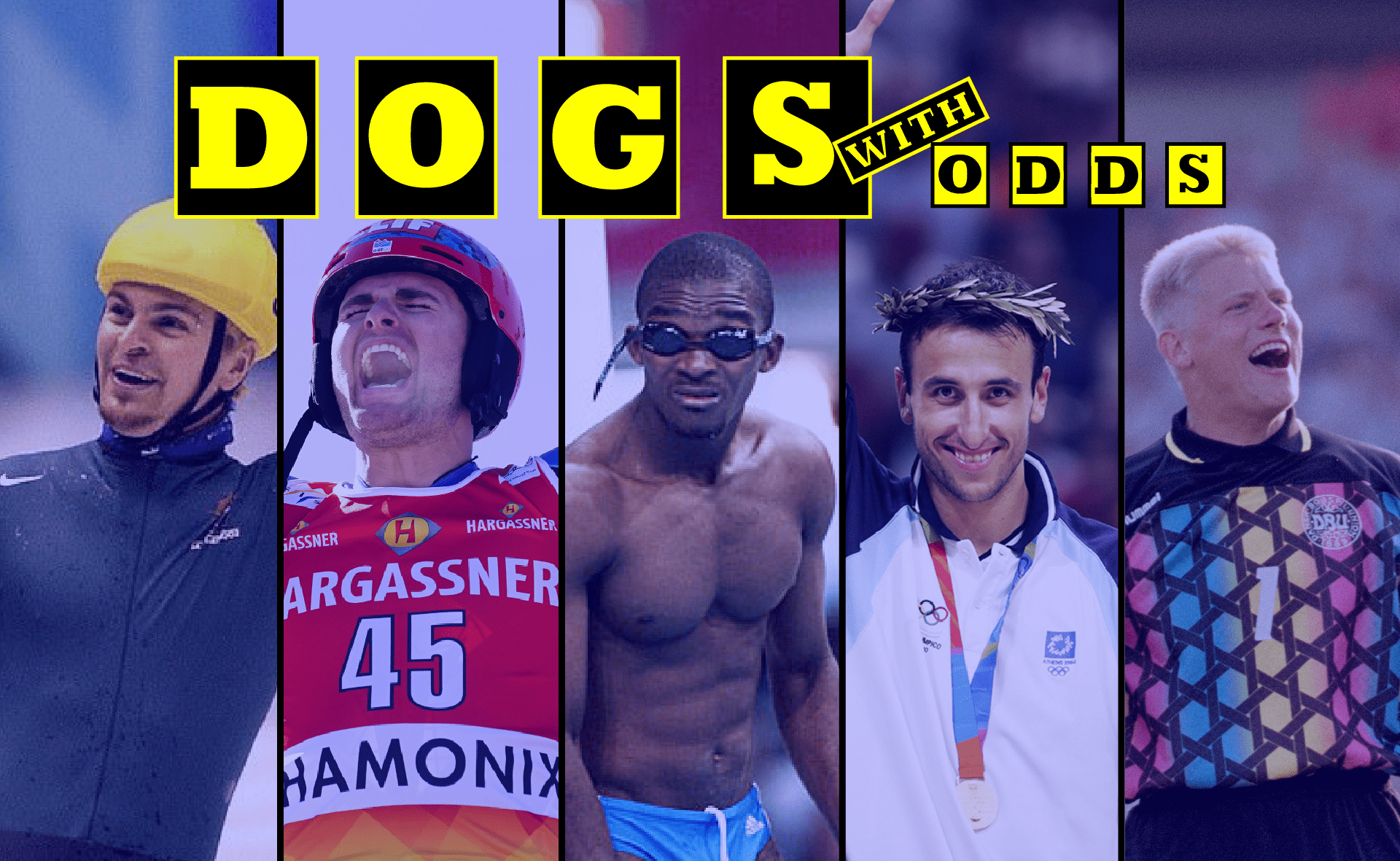
5 TRUE UNDERDOG STORIES
Underdog stories
Aussies on ice, an Eel who could hardly swim and a Greek skier who had more surgery than Pamela Anderson make our list of winners from unlikely places.
BEACH HOLIDAYS INTERRUPTED WHEN DUTY CALLS
DENMARK WIN EURO 92
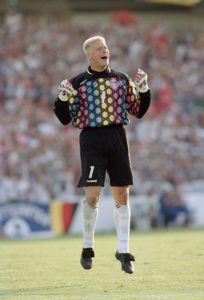
SETTING THE SCENE
The first requisite for winning a major tournament is that you at least qualify for it. In Denmark’s case regarding Euro 1992, they didn’t even do that. They finished second in their qualifying group behind Yugoslavia, so were set to miss out.
Denmark have by no means ever been a powerhouse of international football. They’ve produced a handful of world-class players over the years, sure. But their domestic league is petty modest, they have a small population of under 6 million and though football is the national sport, it competes with the likes of handball and fishing (!) for interest among Danes.
Two weeks before the 1992 Euros, FIFA and UEFA took the unprecedented step of banning Yugoslavia from international football on political grounds: the civil unrest in the Balkan region that broke out in April of that year.
UEFA took the decision to invite Denmark to take Yugoslavia’s place as the runners-up in the group. The Danes took up the invitation as a team but, not everyone was up for it…
WHAT HAPPENED NEXT?
Michael Laudrup, their biggest star, and one half of the famous Laudrup Brothers, decided it wasn’t worth the effort. Playing for Barcelona at the time no less, he was exiled from international football back in 1992 after a fall-out with the national coach Richard Møller Nielsen, and wasn’t in the mood to ruin his summer holidays for an apparently lost cause. Midfield maestro Jan Molby, at Liverpool at the time, felt the same.
But crucially, Brian, the other Laudrup, whose own international career was also in limbo at the time, reported for international duty. He was joined by the likes of Manchester United keeper Peter Schmeichel, all-action midfielder John Jensen and skipper Lars Olsen. Some of the players were lying on a beach at the time UEFA’s decision was announced, others sightseeing around Europe, or preparing to watch the tournament on TV. Two weeks later, they started with a goalless draw against a powerful England side containing the likes of Gary Lineker and David Platt, and then lost 1-0 to hosts Sweden.
You can imagine that round about this time Michael Laudrup and Molby were feeling somewhat vindicated about their decision. But in a must-win game, they beat a France side including Eric Cantona and Didier Deschamps 2-1 in their final group match and from nowhere, had progressed to the semis. A penalty shootout win against a star-studded Netherlands side thanks to a crucial save from Schmeichel against the great Marco van Basten, followed. And now they were in the final.
Ahead of the big game, injuries and suspensions had kicked in and one player had flown home to be with his sick daughter. So they couldn’t even field their best XI. But they weren’t to be stopped. Goals from Jensen and Kim Vilfort either side of half-time stunned the red-hot favourites Germany, who let indiscipline and complacency get the better of them, and the miracle was complete.
Odds: Denmark were the biggest outsiders at the tournament at 20/1.
English to Danish featured on All-in Global’s Top 20 of most translations (by words) in 2022. Unlike Michael Laudrup and Jan Molby, who didn’t feature on Richard Møller Nielsen’s Christmas Card list back in 1992. Get in touch if you need translations from, or into, Danish.
GREEK SKIER ISN’T SLOW IN THE SNOW
AJ GINNIS WINS WORLD CHAMPIONSHIP SILVER
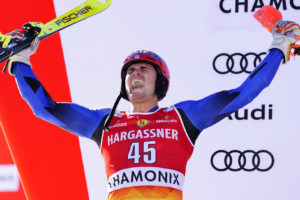
SETTING THE SCENE
When you think of Greek sportsmen, what sports come to mind? Football? Basketball? Wrestling?
Well, if you’re Alexandros Ioannis ‘AJ’ Ginnis, that’s not necessarily the case. The son of the owner of a ski resort in Vouliagmeni in the suburbs of Athens, AJ had been skiing since he was two. He was to find far better opportunities to improve his winter sports skills than in (usually) sunny and hot Greece, when his family moved to Austria when he was 12.
At 15 his family moved again, this time to the USA (his mother is American) and he was quick to enrol in the Green Mountain Valley School in Vermont. After trying out different events over the years, he decided to focus on the Slalom and Giant Slalom. At 18 he was then selected to represent the junior USA Ski Team but a few months later he ruptured his ACL, the injury that all sportsmen most fear, which halted his progress.
Despite further serious injuries, including having surgery five times on the same knee, he made his Skiing World Cup debut in Italy in 2014.
WHAT HAPPENED NEXT?
In January 2021, he became the first Geek alpine racer to register World Cup points for Greece when he finished 11th in Flachau, Austria. But 2023 was the year he really made his breakthrough.
On February 4 2023 in Chamonix, in France, he finished second in the Slalom to become the first Greek skier to secure a podium finish in a World Cup race. But he wasn’t done just yet.
Just two weeks later he was in Courchevel (also France) this time. Tied with Norway’s Lucas Braathen for second after the first run, he just edged him out, with only Henrik Kristoffersen, a veteran of 49 World Cup podiums in slaloms, quicker than him over the two runs. AJ’s silver medal meant another record next to his name: he became the first Greek skier to secure a medal at the World Championships.
If you watched the 2023 Australian Open men’s final, you’ll remember a sobbing, exhausted and tearful Novak Djokovic curled up like a ball next to his entourage, moments after defeating Greek (they’re good at these sports these days, eh?) star Stefanos Tsitsipas. Curiously, Tsitsipas hails from the same town of Vouliagmeni where AJ’s father had his ski school.
Well, Ginnis very much took a leaf out of Djokovic’s book when it came to his highly emotional celebrations. Sweeping aside his tears, he was able to tell reporters:
“Fighting back from injuries, getting cut from teams, trying to fundraise for what we’re doing now… I thought two weeks ago was crazy, getting my first World Cup podium, and to be able to ride that wave until today was just special.
Last year I tore my ACL and when I came back, I told myself that my goal was going to the next Olympic cycle being a medal contender. A year later, I’m sitting with a silver on my neck at the World Championships, it’s just crazy to think.”
Crazy indeed.
Odds of AJ winning silver in Courchevel: We couldn’t find any actual odds on this. But with some form to his name from a strong previous showing just two weeks earlier, we reckon he was about a 15/1 chance.
New client? Contact us!
ERIC THE EEL MAKES A SPLASH IN SYDNEY
EQUATOGUINEAN MAKES HISTORY
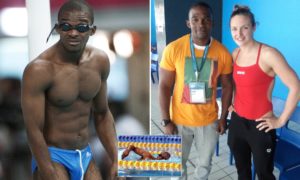
SETTING THE SCENE
Quite why Eric Moussambani of Equatorial Guinea decided he was desperate to take up swimming at the age of 22 and try to qualify for the Olympics, has never been particularly clear. And what he had in terms of desire and commitment, he lacked in resources. In the eight months he’d been learning to swim, he did so at a lake and later at a hotel swimming pool that at 13 metres long, was roughly a quarter of the size of an Olympic pool.
Good sports that they were at the Hotel, he had all of one hour a day to use it…between 5 and 6am. His swimming teachers? Local fishermen whose primary objective was that he didn’t sink, as opposed to perfecting his dive or ability to turn quickly.
While the likes of the USA, South Africa and Australia held extremely competitive cutthroat national trials to see which two swimmers qualified for the 100m freestyle, Eric was handed a wildcard. In a bid to have greater diversity at the Olympics and give a chance to developing countries with poor facilities a chance to have athletes present at the 2000 Olympics, the invitation from the Olympic Committee was in the post.
And thanks to that, Eric was off to the Olympics in Sydney, as the first-ever Equatoguinean to compete in an Olympic swimming event.
WHAT HAPPENED NEXT?
Eric was first up in the qualifying heats, the round before the semi-finals. He was up against two swimmers, one from Niger and the other from Tajikistan. But he had bigger problems than those two. He had never even seen a 50m metre pool before, let alone swam in one. But soon, three became one. The other two were disqualified due to false starts and Eric was told he’d be swimming alone.
For 1 minute and 52.72 seconds, in a venue with 17,500 seats, Eric thrashed his way round the pool, arms all over the place, head swinging from side to side, no discernible swimming technique to speak of. English journalist Craig Lord, who gave him the ‘Eric the Eel’ nickname, admitted that at one stage he thought Olympic staff might have to jump into the pool to save him from drowning. Such were his struggles to keep going, as exhaustion kicked in for someone not used to swimming for 100m without a break. ‘The last 15 metres were very difficult’ Eric later recalled. But against the odds, he finished the race. Technically, he won it.
But thankfully for his own dignity and safety, there was to be no semi-final ahead for him. With that time, he was last out of 71 competitors. Despite it only being 100m, he was 50 seconds slower than the swimmer who finished 70th and a minute slower than eventual winner Pieter van den Hoogenband. The last-place finisher in the women’s 100m freestyle heat was 33 seconds quicker than him.
No matter. His place in Olympics folklore was guaranteed.
Odds of ‘Eric the Eel’ winning 100m Olympic Gold: 10,000/1 (then add a few zeros at your discretion).
Did you know? Equatorial Guinea is just one of two African countries (the other being the largely unrecognised Sahrawi Arab Democratic Republic) to have Spanish as an official language. French and Portuguese are also official languages and at All-in Global, we offer translation and content writing services in all three.
BRADBURY DOES A BRADBURY
AUSSIE SKATER COMES FROM NOWHERE TO WIN OLYMPIC GOLD
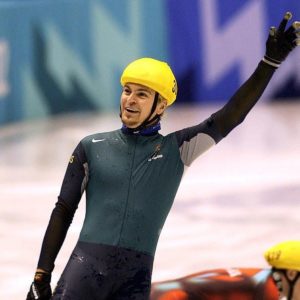
SETTING THE SCENE
The next of our underdog stories features another sportsman whose nationality certainly didn’t suggest his choice of sport was going to end in glory. If you’re a young Aussie with a talent for sports, there’s plenty of choice as to what you might take up. Cricket, rugby (Union or League), Aussie Rules, tennis, soccer, swimming, cycling, to name but a few.
What you don’t often hear from a budding Australian sportsman is: ‘Ya know what, mate? I fancy a go at some speed skating. The ice kind.” But short track speed skating it was for Bradbury who before 2002, had already competed at the 1994 and 1998 Winter Olympics. He was part of the Australian team who won a shock bronze medal when Canada crashed and lost lots of time in the final. But he’d had no real success on an individual level. And it was something of a miracle that he was competing at the 2002 Olympics at all.
In 1995 he suffered a horrendous injury when another skater’s blade accidentally cut his thigh, resulting in him losing a significant amount of blood and receiving over 100 stitches. He later said that if he’d fallen unconscious while he was being treated, he may never have woken up. Five years later his career was almost over when he broke two vertebrae in his neck during training.
When he took part in the 2002 Olympics he was making ends meet by making skating boots in a backyard workshop and had to borrow 1,000 Aussie Dollars from his parents to fix up his car, so he could go training. Things weren’t looking good for Bradbury ahead of the Salt Lake City Olympics, who at 29, was also very much in the twilight of his career.
WHAT HAPPENED NEXT?
Bradbury won his first-round heat comfortably. But in the next round, the quarter-finals, he was up against favourite Apolo Anton Ohno of the USA and defending world champion Marc Gagnon, of Canada. With only the Top 2 progressing to the semis, in his mind Bradbury had already packed his bags to go home after finishing third, behind the two favourites. But he had to mentally unpack them because Gagnon was later disqualified for obstructing another racer. Bradbury was in the semis.
Ahead of the semi, Bradbury and coach Ann Zhang came up with a plan. It was pointless to go toe-to-toe with faster, younger skaters so the strategy was simple: don’t crash. Sure enough, all three of the other skaters in the race took each other out, paving the way for Bradbury, who was last by some distance for most of the race, to skate past them, win the semi and skate his way into the final. And he was in no mood to abandon this strategy in the final.
Local hero Ohno was there and when he and the three others jostled at the final corner going for gold, they all crashed and created a major pile-up. They looked on in horror as Bradbury, 15 metres behind them all, cruised past them to ensure he, Australia and the Southern Hemisphere as a whole, had their first Winter Olympics Gold.
“I’ll accept this gold medal. But not for the 90 seconds of the race – I’m going to take it for the 14 years of hard work.” he famously said in the aftermath.
2002 was to be his last dance as a speed skater, announcing his retirement shortly after. His face appeared on an Australian stamp four days after his triumph and he used the 20,000 Aussie Dollars from the use of his image to buy a new car… so he didn’t have to keep on borrowing money from his parents.
In 2016 the expression ‘doing a Bradbury’ was entered into the Australian National Dictionary, meaning an unexpected or unusual success.
Odds of Bradbury winning Olympic gold: We can’t track down the actual odds at the time but we’ll estimate they were about 1000/1 at the start of the competition and 100/1 going into the final.
SYDNEY HEARTBREAK FOR THE USA
ARGENTINA WIN OLYMPIC GOLD IN… BASKETBALL
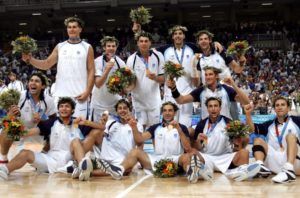
SETTING THE SCENE
Messi, Maradona, Tevez, Aguero, Kempes, Batistuta, Riquelme, Zanetti…when thinking of Argentina’s great footballers past and present, the names just roll off the tongue. But can you name an Argentinian basketball player?
Maybe not but the ‘Class of 2004’ was responsible for one of the biggest upsets in Olympic history. In truth, there were clues that this Argentina side had serious potential.
San Antonio Spurs legend Manu Ginobili was one of eight players in the Argentina team of 2004 who had featured in the NBA at some stage, though Ginobili aside, they weren’t exactly stars. And they had done the unthinkable two years earlier, becoming the first side to beat a USA team including NBA players in an international match when getting the better of them at the 2002 FIBA World Championships. But they didn’t start the 2004 Olympics particularly well. They finished third in their Group behind Spain and Italy, losing to them both, and scraped a 83-82 win over Serbia and Montenegro.
In the quarters they beat Greece (them again?) in a low-scoring match, winning 69-64.
Up next: the USA.
WHAT HAPPENED NEXT?
Since they started to include NBA pros in 1992, the USA had won gold at all three Olympic Games they’d taken part in. Post-2004, they won gold in the next four editions. But it wasn’t to be in 2004.
Led by Ginobili who finished the game with 29 points, Argentina were a sort of Band of Brothers who were bigger than the sum of their parts, showing great team spirit and comradery. They beat the USA 89-81 in a game where the USA’s players were held back by youth, inexperience and a lack of team chemistry, as an outfit who had rarely played together before.
As Ginobili himself graciously put it: “In 1992, the USA had the best players ever. Here they are great players, too, but they are young, and they never played internationally, so with different rules it’s a whole different thing. The rest of the world is getting better and the States isn’t bringing their best players.”
All true, but still.
This was a side that included two league MVPs in Tim Duncan and Allen Iverson and two superstar youngsters in Carmelo Anthony and Dwayne Made. It also included in 19-year-old Lebron James, the man who recently became the highest points scorer in the history of the NBA. In other words, inexperienced or otherwise, this was a side for whom it should have been enough to just show up to go on and win the game.
Just as important as that win was the fact they held their nerve in the final rather than throwing it away after doing all the hard work. The very next day they got their revenge on Italy, beating them 84-69, to take gold. In many ways, it was a far greater achievement than any of their three football World Cup wins.
Odds on Argentina winning 2004 Basketball Gold: We’re speculating here but we’re going 33/1.

